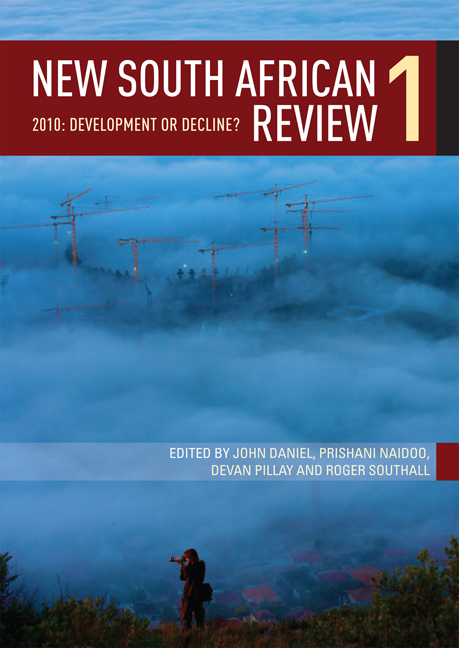Book contents
- Frontmatter
- Contents
- Preface
- Introduction South Africa 2010: From short-term success to long-term decline?
- PART 1 ECONOMY, ECOLOGY AND SUSTAINABILITY
- Introduction South Africa and the eco-logic of the global capitalist crisis
- CHAPTER 1 The state of the South African economy
- CHAPTER 2 The international economic crisis and employment in South Africa
- CHAPTER 3 The economic impact of South Africa's 2010 World Cup: Ex ante ambitions and possible ex post realities
- CHAPTER 4 Growth, resource use and decoupling: Towards a ‘green new deal’ for South Africa?
- CHAPTER 5 Planning for sustainable living with limited water
- PART 2 STATE, POLITICS AND POLICY
- PART 3 EDUCATION, HEALTH AND LAND
- PART 4 Doreen Atkinson
- Contributors
- Index
Introduction - South Africa and the eco-logic of the global capitalist crisis
from PART 1 - ECONOMY, ECOLOGY AND SUSTAINABILITY
Published online by Cambridge University Press: 21 April 2018
- Frontmatter
- Contents
- Preface
- Introduction South Africa 2010: From short-term success to long-term decline?
- PART 1 ECONOMY, ECOLOGY AND SUSTAINABILITY
- Introduction South Africa and the eco-logic of the global capitalist crisis
- CHAPTER 1 The state of the South African economy
- CHAPTER 2 The international economic crisis and employment in South Africa
- CHAPTER 3 The economic impact of South Africa's 2010 World Cup: Ex ante ambitions and possible ex post realities
- CHAPTER 4 Growth, resource use and decoupling: Towards a ‘green new deal’ for South Africa?
- CHAPTER 5 Planning for sustainable living with limited water
- PART 2 STATE, POLITICS AND POLICY
- PART 3 EDUCATION, HEALTH AND LAND
- PART 4 Doreen Atkinson
- Contributors
- Index
Summary
South Africa has been severely affected by the global financial crisis. Despite a return to growth in 2010, the crisis will come back as long as its fundamental roots are not addressed. Indeed, we need to ask whether the crisis is a purely ‘financial’ one, or multidimensional. Is it of recent origin, or something that began with the market liberalisation of the late 1970s – or does it go right back to the origins of capitalism as a world system, of which South Africa is a microcosm?
Despite the fact that SA's financial sector was much better regulated than at the centres of the global system, the financial crisis has deepened an already severe socio-economic crisis. As the chapters that follow show, it accelerated declining manufacturing output or the deindustrialisation of the economy, partly because of a decline in global demand and partly because of the rand's rise against the British pound and US dollar. Most severely, up to one million jobs were lost in 2009, in a context of massive unemployment (unofficially close to 40 per cent of economically active citizens), rising social inequality and persistent poverty. To take two telling indices: over one-third of the population is food insecure, and a quarter of children under six years of age is malnourished (Human Sciences Research Council, cited in Andrews 2008).
At a fundamental level, there are increasing indications that the country's growth trajectory faces a crisis of ‘sustainability’ in both senses of the word – sustainable growth that creates decent jobs and rising living standards for all, as well as sustainable growth that protects the natural environment and leaves the earth with sufficient resources for future generations. This crisis is rooted in the structure of the South African economy, which was inherited from the colonial past.
In South Africa, racial capitalism emerged as a result of a minerals-energy complex (Fine and Rustomjee 1996) – a synergy between the mining industry and fossil energy systems that sustain it, as well as a financial sector that grew out of it. This minerals-energy-financial complex remains central to South African capitalism, subordinating all other economic activities, including manufacturing. It rests on the exploitation of fossil fuels and risky mining operations that have seen the death of tens of thousands of people over the last century.
- Type
- Chapter
- Information
- New South African Review2010: Development or Decline?, pp. 24 - 38Publisher: Wits University PressPrint publication year: 2010



